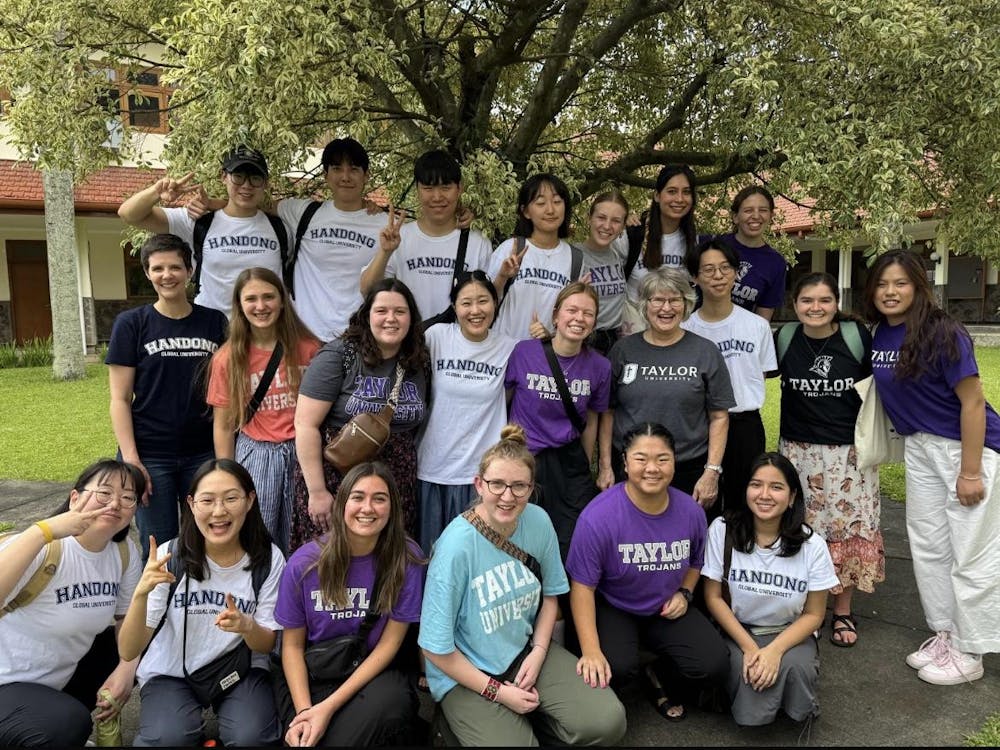The plane touched the runway at 6:31 p.m. on Jan. 4, 2025.
Over 25 hours of airports and planes, the Taylor group of 12 arrived in Surabaya, Indonesia, to join the Handong Global University students of South Korea. For the first time in Taylor University’s history, Taylor and Handong students partnered for a study abroad to teach English.
The team was led by Jan Dormer, director of TESOL and ESL and professor of TESOL at Taylor, and Megan Beard, TESOL adjunct through Taylor online and adjunct at Handong Global University for TESOL courses.
Leaving the hotel as early as 7 a.m., the team drove 30 minutes to sometimes two hours away from Malang to Muslim schools. On arrival, the schools often greeted the university students with cultural dances and food.
The team consisted of 20 students. Each teaching pair consisted of a Taylor student and a Handong student. They taught English at Muslim, Christian and Hindu schools, ranging from K-12 grades.
“It is challenging to co-teach in any circumstances,” Dormer said. “It is challenging to co-teach cross-culturally with someone of a different culture. It is challenging to be teaching for the first time, as many of you were teaching English learners for the first time, so it's challenge upon challenge upon challenge.”
Dormer’s biggest concern for the trip was that the challenges would be too much for somebody.
Beard said with all the layered challenges and stresses, so many things could go wrong.
“It was terrifying – it is terrifying – but I think what gave me a measure of confidence, and it really is faith, is we knew it wasn't just about pairing up native and non-native speaking teachers,” Beard said.
She said it was about choosing people who had a desire to follow Christ and learn from each other.
As students pushed through hardship such as learning how to communicate through, in and about conflict in a cross-cultural context, they became different people, Beard said.
“We're helping each other grow more like Christ,” Beard said. “And then when we do that in front of students, they see that there's something different. They see that there's a mutual respect and a shared sense of responsibility and a mutual submission to each other in a lot of ways, that really, I think that kind of attitude is a great testimony and a great witness to what it means to be in Christ.”
As the trip neared its end, the TESOL team went to Bali. Dormer and Beard led a conference at a Hindu university on effective English teaching.
After the conference, the Handong, Taylor and the Hindu students partnered in groups of four to create a lesson plan. The next day, Jan. 24, the groups taught their lessons in a high school.
Putu, a Hindu university student, said it was a really good experience for him.
“It's amazing because it's (a) different culture and we can gather together, and teach English,” he said.
Afterwards, the TESOL team gathered to reflect on their partnership with one another as well as with the Hindu students.
Sophomore Maya Kuszak said partnering with other cultures to teach English acted as a bridge to students, the English language learners (ELLs). It wasn’t just an American teacher and an Indonesian student. Rather, teaching as an American and a South Korean gave breadth to what English speakers could look and sound like, she said.
“Everybody has different strengths and weaknesses, and through this experience, I learned about my own weakness and strengths and how to adopt the other person's strengths and how to help in their weaknesses in working together,” Ah hye, senior at Handong, said.
She said it wasn’t always easy to teach together because she and her partner were very different, coming from different cultures, thinking in different ways. But, through the process, her perspective widened.
Dormer said at the end of the trip, everyone had risen to the challenge – above and beyond. For her, that was so satisfying.
“It worked,” she said. “Everybody invested; everybody learned; people made new friends. People learned about at least two other cultures – you know – everybody learned about Korean and Indonesian or American culture.”





